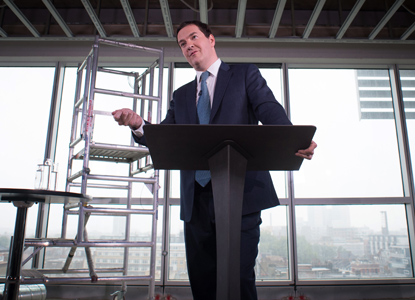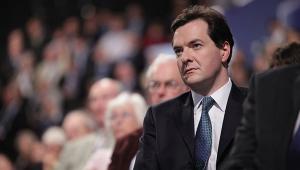By Richard Johnstone | 9 September 2013
Recent positive economic figures have ‘decisively ended’ the debate over whether the government’s austerity policy is correct, Chancellor George Osborne claimed today.

In a speech in London, Osborne said the UK economy was now ‘turning a corner’, as there are ‘tentative signs of a balanced, broad-based and sustainable recovery’.
Osborne’s comments come after the Office for National Statistics revised up its estimate for growth in the second quarter of 2013 from 0.6% to 0.7%. Other economic forecasters, such as the CBI, have also issued more optimistic growth predictions in recent months.
The chancellor said these showed that the government’s economic plan was ‘the right response to Britain's macroeconomic imbalances and the evidence shows that it is working’.
Those who advocated a ‘Plan B’ of slower cuts in spending had ‘lost the argument’, he added.
‘The economic collapse was even worse than we thought. Repairing it will take even longer than we hoped.
‘But we held our nerve when many told us to abandon our plan. And as a result, thanks to the efforts and sacrifices of the British people, Britain is turning a corner.’
The ‘hard, difficult road’ remained the ‘only way to deliver a sustained, lasting improvement in living standards’, he added.
‘Of course, many risks remain. These are still the early stages of recovery. But we mustn't go back to square one. We mustn't lose what the British people have achieved.’
Abandoning the government's economic plan by slowing the pace of spending cuts would still be ‘disastrous’, Osborn said, although he acknowledged that Gross Domestic Product growth had been lower than predicted since the government came to power.
He insisted this could not be explained by government cuts. ‘Instead, the composition and timing of the slowdown in GDP growth relative to forecast is better explained by external inflation shocks, the eurozone crisis and the ongoing impact of the financial crisis on financial conditions.’
Now, he said, growth has accelerated despite government spending cuts having continued as planned. If the impact of government cuts on the economy was as stark as those arguing for a ‘Plan B’ had stated, this would not be possible.
‘The only sustainable path to prosperity is to reject the old quick fixes and stick to the course we have set.’
Osborne also stated that the government was focused on easing the burden on families, and would set out further steps to do so in the autumn.
‘I know that times are tough and that family budgets are squeezed,’ he said. ‘But fundamentally, Britain is poorer than it was not because government didn’t intervene enough, or rail regulation wasn’t tough enough, or rental policies weren’t fair enough.
‘Britain is poorer because of a massive failure of economic policy in the last decade.’




















